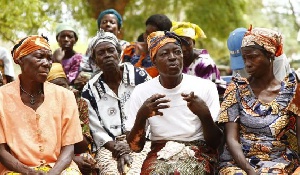 File photo of some LEAP beneficiaries
File photo of some LEAP beneficiaries
The Ministry of Gender, Children and Social Protection has disclosed that beneficiaries on the Livelihood Empowerment Against Poverty (LEAP) have been connected to the financial services through the E-zwich electronic payment platform.
Minister, Cynthia Morrison, told the media on Wednesday, September 2, 2020, five cycles of LEAP cash grants have been paid to 334,084 households to help smoothen their daily consumption.
“A total of 1,451,656 extremely poor beneficiaries are currently on the LEAP register. Other achievements chalked under the LEAP include; development of an emergency payment strategy for LEAP in the wake of COVID 19 pandemic, regular engagements with district Social Welfare officers, participating financial Institutions and GHIPSS to discuss and provide solutions to electronic payment challenges,” she said the Meet the Press series on Wednesday.
According to the minister, 73% of LEAP beneficiaries have been enrolled onto the National Health Insurance Scheme with 5,522 individuals linked to other complementary and productive activities. She gave the breakdown is as follows; Labor Intensive Public Works- 3,054, Japaneese Social Development Fund -1,235, Village Savings and Loans Association -348 and Complimentary Income Generating Scheme -537.
“Currently, Upper West and Upper East regions have data on socio-economic status of 137,565 and 184,125 households respectfully. Northern, North East and Savannah have data on the socio-economic status of 140,000 households so far. The GNHR is currently continuing with data collection in the North East, Northern and Savannah Regions to obtain an updated and more comprehensive database on poor and vulnerable persons in the country,” she said.
The Minister also mentioned that the Ghana National Household Registry has been instituted to collect data on the vulnerable in Ghana and become the centre of targeting for social interventions programmes including the Livelihood Empowerment Against Poverty (LEAP), LIPW, NHIS among others.
This data, according to her is useful for planning by the various Metropolitan,Municipal and District Assemblies (MMDAs), Academia, Non-Governmental OrganiSations (NGOs), Civil Society Groups and other agencies in social development. The objective of the GNHR database is to improve targeting efficiency and effectiveness and make it easier for government to identify and target the poor and vulnerable for all social protection interventions in Ghana.